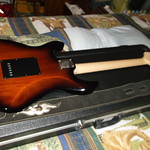Topic: Test your Sustain
I discovered a good way to test a guitar's sustain, you old timers may all ready know about it.
but it might help a fellow, out to buy a new guitar or just to compare..........or maybe tell you when it's time to change strings.
I will post my results here and hope I get some comparative feedback......
You'll need a stop watch I used my cell phone it has a timer under the tools menu it works great
You need an decent tuner that senses the vibrations at the neck, a clip on type.
I have several different types some use and internal microphone but I wanted to use one that strictly
uses vibration only, for obvious reasons, it is the vibrations we are testing.
I have 3 of these a Korg, Yamaha, and Snark, of the 3 I like the Snark best because it will lock on to the tonic and stay locked until the vibrations die off then it will drop back to zero.........
After you have carefully tuned up your guitar leave the tuner clipped on and get out you cell phone or stop watch
Use a medium or light pick, strike the string about the way you would a good strumming lick
Press start as soon as the tuner locks on, and press stop immediately when it goes to zero
Record your numbers.
The results are how long that guitar held the note, that is important, the longer the better.
My numbers on the Yahama Pacifica using the snark tuner and light pick were:
Sixth low E.............19.37 seconds
Fifth A.............18.51 secs.
Fourth D............ 17.15 secs.
Third G.............15.19 secs.
Second B............ 9.66 secs.
High e.............12.78 secs.
That B string looks like I need to inspect, 9.66 was as high as it ever got after several test runs. Maybe it is set too low or some wrong at the bridge or Nut or the string is damaged...... If I find something I will post it
Try this and let let us compare results............
PS. After close exam I found a bit of lint from a buffing cloth hung onto the the B.
After clearing this the B will hold until about 12 secs. now, closer to high e ...............
Speak up I don't see as good as I used to!
